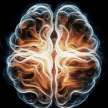HOW LOVE CHANGES YOUR BRAIN
THE SCIENCE OF FALLING IN LOVE

Heartwarming, heartbreaking, and heart wrenching are common adjectives used to express love.
What role does the brain play in this, then?
Everything! Neurochemicals and brain systems work together to steer the trip from the initial spark to the last tear. You might notice that when you start to fall in love, you find yourself thinking about them nonstop and wanting to hang out with them more and more.
Psychologists refer to this initial phase of love as infatuation, or intense love. Your new connection may feel practically addictive, but that's not far from the truth in terms of the brain. Infatuated people are more active in the ventral tegmental area.
The ventral tachycardia (VTA) is the brain's center for processing rewards and motivation. It fires in response to many stimuli, such as eating a delicious treat, drinking water, or, in more severe situations, abusing narcotics.
Dopamine, a neurotransmitter that makes you feel good, is released upon activation, encouraging your brain to repeat actions in anticipation of getting the same original reward. This enhanced VTA activity is the reason love is not only euphoric but also pulls you toward your new companion.
At first, it may be difficult to find any flaws in your new ideal partner. This haze is caused by love's effect on higher cortical brain regions. The prefrontal cortex, the brain's thinking center, exhibits lower activity in certain recently enamored people. Since this region is activated when we think critically and make judgments, it makes sense that we would have rose-colored glasses when it comes to new relationships.
The initial stage of love, known as attachment or compassionate love, can be an intense emotional rollercoaster with increased brain activity, but it usually ends after a few months to give way to the more persistent stage of love.
The hormones oxytocin and vasopressin play a major role in making you feel more at ease and devoted to your partner as your relationship progresses. These hormones, also referred to as pair-bonding hormones, are indicators of attachment, social support, and trust.
Since these hormones also serve to strengthen friendships and families, romantic love is comparable to other types of love in this regard.
Furthermore, the release of stress hormones can be inhibited by oxytocin, which explains why spending time with a loved one can be so soothing. A deeper connection and a more sincere understanding may take the place of early love's ability to suspend judgment as it wanes.
On the other hand, relationship issues could show more clearly as your rose-colored glasses start to fade. We may attribute the mental suffering that follows heartbreak to the brain, regardless of the cause of a relationship's demise.
The insular cortex, an area that absorbs pain—both social and physical, like spraining your ankle—is activated by the misery of a breakup. After a few days, you can start to want for or daydream about your ex-partner once more. It could feel like an overwhelming hunger or thirst—the need to reach out.
Heartbroken people have higher activity in the VTA, the motivation and reward center that fueled feelings of longing in the early stages of the relationship, when they view pictures of their ex-partner. This emotional tornado may make you feel uneasy and restless because it triggers your body's stress axis, which acts as an alarm system.
Over time, the higher cortical regions, which are in charge of impulse control and cognition, have the ability to suppress this distress and hunger signaling. It makes sense that the pain of experiencing one's first grief would be especially intense during adolescence, as these areas are still developing and forming connections.
The feel-good neurotransmitter dopamine is released when engaging in activities that calm the emotional stress response, such as working out, hanging out with friends, or even just listening to your favorite music. And most people can recover from even the most severe heartbreak if they are given the necessary time and assistance.
WRITTEN BY: AUSTIN RACHAEL
About the Creator
Enjoyed the story? Support the Creator.
Subscribe for free to receive all their stories in your feed. You could also pledge your support or give them a one-off tip, letting them know you appreciate their work.






Comments
There are no comments for this story
Be the first to respond and start the conversation.